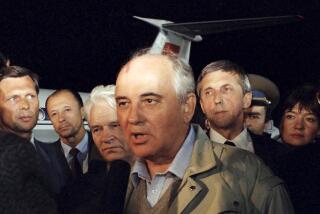Gorbachev Urges Talks on Europe ‘Commonwealth’
- Share via
ROME — Soviet President Mikhail S. Gorbachev appealed Thursday for East-West cooperation to build “a commonwealth of sovereign democratic states” in Europe based on ethnic and political tolerance, religious freedom and pluralism.
Climaxing a triumphant Italian visit with a 38-minute address at the Campidoglio, Rome’s historic City Hall, Gorbachev proposed a conference with U.S. and European leaders next year to restructure relationships for what he called “an entirely new era.”
“We envision Europe,” he said, “as a commonwealth of sovereign, democratic states with a high level of equitable interdependence and easily accessible borders open to the exchange of products, technologies and ideas, and wide-ranging contacts among people.”
The Soviet leader applauded the dramatic changes taking place across East Europe as a necessary renewal of socialism.
“Having embarked upon the road of radical reform,” he said, “the socialist countries, one after another, are crossing the line beyond which there is no return to the past.”
On the eve of a historic meeting with Pope John Paul II, Gorbachev said the Soviet Union has changed its view of religion.
“In our country,” he said, “church is separated from state. But now we not only proceed from the assumption that no one should interfere in matters of the individual’s conscience; we also say that the moral values which religion generated and embodied for centuries can help in the work of renewal in our country, too. In fact, this is already happening.”
Gorbachev, who will fly to Malta tonight for a weekend of meetings with President Bush, said he expects these meetings to “enable us to take a new, constructive step in the movement from mutual understanding to mutual action in Soviet-U.S. relations.”
“Our time is indeed a watershed of destiny,” he went on. He said the pace of events demands a broad summit meeting, which he suggested should be held in 1990. He called it “Helsinki 2,” after the 1975 meeting of the Soviet Union and 33 other European countries plus the United States and Canada, which established a framework for continental security and cooperation.
Italy, a member of the Western Alliance, actively supports Gorbachev’s program of perestroika , or political and economic restructuring. The two governments signed more than a dozen agreements Thursday for cooperation in areas ranging from the conversion of Soviet arms industries to anti-drug and environmental cooperation to cultural, scientific and intellectual exchanges.
A joint statement committed the two governments to a peaceful, united Europe.
“It is necessary to progressively remove the barriers of mutual mistrust stemming from decades of confrontation and strict ideological opposition,” the statement said. “The future international order should increasingly be based on the universal values of freedom, of all forms of national, ethnic and religious tolerance, and of pluralism.
“In some countries, an in-depth and courageous revision of both domestic and foreign policies is under way, and changes toward democracy are taking place. It is necessary for the principles of democracy to be present in every society, together with the respect for the sovereign right of each and every people to choose its own way to development,” he said.
“The success of this process is in everybody’s interest. Under the pressure of these factors, the curtain of mistrust between the East and the West is crumbling.”
Self-determination, the two governments agreed, must underlie the European future. The statement said, “The parties equally believe that every people is the master of its own destiny, including the choice of its sociopolitical order, its evolution and the implementation of the necessary reforms.”
Thursday’s accord extended and refined agreements that Gorbachev has signed after visits in the last year to Paris, Bonn, Helsinki and New Delhi.
Gorbachev was obviously impressed by what he has seen in Italy. “We have been enchanted,” he said, “by the friendly and sincere atmosphere that surrounds us here.”
He said the dramatic change in Eastern Europe does not represent the defeat of communism but its renewal.
“Unless we get rid of all things associated with the deformations of socialism in the past, we will not succeed in implementing the ideas of perestroika ,” he said.
Calling perestroika “our renaissance,” he described the philosophy of his reform as “getting to know ourselves, revealing ourselves to the world and discovering the world.”
SOVIET IN SICILY--Tens of thousands of Italians greet Soviet First Lady Raisa Gorbachev in Sicily. A24
More to Read
Sign up for Essential California
The most important California stories and recommendations in your inbox every morning.
You may occasionally receive promotional content from the Los Angeles Times.













